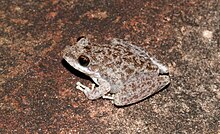Copland's rock frog or the saxicoline tree frog (Litoria coplandi) is a species of frog in the subfamily Pelodryadinae. It is endemic to Australia, in a range extending from the Kimberley region of Western Australia to Arnhem Land and a record in the north of Queensland.[1] Its natural habitats are subtropical or tropical dry shrubland, subtropical or tropical dry lowland grassland, intermittent rivers, and rocky areas.
| Copland's rock frog | |
|---|---|

| |
| Scientific classification | |
| Domain: | Eukaryota |
| Kingdom: | Animalia |
| Phylum: | Chordata |
| Class: | Amphibia |
| Order: | Anura |
| Family: | Hylidae |
| Genus: | Litoria |
| Species: | L. coplandi
|
| Binomial name | |
| Litoria coplandi | |

| |
The IUCN Red list gives the conservation status of least concern, and notes the population trend as stable.[1]
The publication of the species, by Tyler in 1968, was based on his study of a type collection by Copland.[3] The collection, 29 specimens at the Western Australian Museum, was reassigned as three syntypes; for this species, Litoria watjulumensis, and Litoria peronii. The holotype for L. coplandi was collected at Inverway Station in the Northern Territory.[2]
References
edit- ^ a b c Jean-Marc Hero, Paul Horner, Dale Roberts (2004). "Litoria coplandi". IUCN Red List of Threatened Species. 2004: e.T41085A10385969. doi:10.2305/IUCN.UK.2004.RLTS.T41085A10385969.en. Retrieved 14 November 2021.
{{cite journal}}: CS1 maint: multiple names: authors list (link) - ^ a b Department of the Environment and Water Resources. "Species: Litoria coplandi (Tyler, 1968) Copland's Rock Frog". Australian faunal Directory. Australian Government. Archived from the original on 11 April 2011. Retrieved 13 July 2009.
- ^ Tyler, M.J. 1968. A taxonomic study of hylid frogs of the Hyla lesueuri complex occurring in north-western Australia. Records of the South Australian Museum 15: 711–727 [716].
